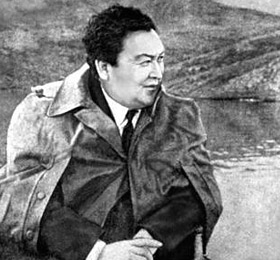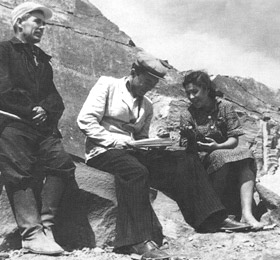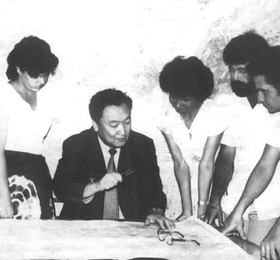THE ENGLISH LANGUAGE PROGRAM FINISHES AT KOZYBAYEV UNIVERSITY
The two-year English Language Program that the Yessenov Foundation has been implementing since 2013 at regional universities in Kazakhstan, has been completed in Petropavlovsk. In 2022-2024, the charitable Foundation conducted it at Kozybayev University. Having improved their English language skills, 301 students and teachers successfully completed the Program. The 50 best North Kazakhstan students and teachers passed IELTS at the expense of the Foundation.
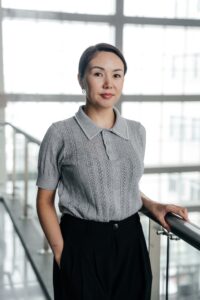 Aigerym Sultan, the Program manager, tells about the procedure and the results of the Program implementation.
Aigerym Sultan, the Program manager, tells about the procedure and the results of the Program implementation.
Kozybayev University, which is located in Petropavlovsk, won the English Language Program competition held by the Shakhmardan Yessenov Science & Education Foundation in spring 2022. 18 universities participated in the competition at that time. In the framework of the Program, students and teachers of the winning university, who have passed the preliminary selection, take two classes with certified native English-speaking teachers every week of the academic year. At the end of each academic year, the best of them pass IELTS at the expense of the Yessenov Foundation.
Aigerym, how many students and teachers took part in the Program at Kozybayev University?
In the first year, 93 bachelors as well as 74 teachers and master’s students were enrolled in the Program, and in the second year, 77 and 105 people respectively. I.e., a total of 349 people participated in the Program, 301 of them reached, as they say, the final. Challenging program, difficulties in understanding native English speakers, heavy academic or professional workload caused the outflow of students.
Could the first year program participant also be selected for the second year of the study?
Yes, the first year program participants could continue their study. There were quite a lot of them.
How was the training going?
Classes were held online twice a week for 90 minutes. The courses were conducted by native speakers and professional teachers. The curriculum included many practical activities. Participants developed both oral and written forms of speech.
How did you measure changes in the Program participants’ English proficiency levels, and what were the results?
To assess the participants’ progress, the Program tutors administered grammar tests and speaking exams twice a year. The results showed that all the participants improved their English language skills by at least one level. That is, if at the beginning of the academic year a student was at the A2 level (Pre-Intermediate), by the end it was already the B1 level (Intermediate). The Program participants improved their vocabulary as well as their written and spoken languages. The most advanced students of the English Language Program of the Yessenov Foundation at Kozybayev University got a good practice preparing for IELTS. As a result of the training, in two years 28 participants moved to a C2 level, 44 to C1, 62 to B2 and 101 people to a B1 level.
After talking to Aigerym, we asked for feedback from the Program participants.
Dariya Tulegenova, a 4th year student of general medicine:
– Audio lessons, video footage and interactive tasks made the learning process interesting and dynamic. The teacher was always willing to overcome language learning challenges. Now I feel more confident in speaking and understanding English.
 Temirlan Yessmagambet, a 1st year student of management information systems:
Temirlan Yessmagambet, a 1st year student of management information systems:
– The upside is that the teacher was responsive, and there was a good material for preparing for IELTS. The downside is that it was an online lesson and after a while interest faded.
Chingiz Dauletbayev, intern, general practitioner:
– In two years I improved my level from Elementary to Upper Intermediate. There is no language environment in our city, and the Yessenov Foundation helped solve this problem. I got the opportunity to communicate with a native speaker, developed my listening skills, and improved my vocabulary. It would be great if more class time was spent on writing.
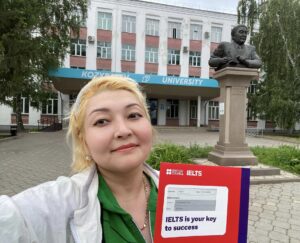 Dilyara Seydakhmetova, the University librarian:
Dilyara Seydakhmetova, the University librarian:
– I didn’t have time to study English before because of my workload, but thanks to the Program at our University, I not only took up the language, but was also able to pass IELTS. Thanks to our teacher Anthony.
Gulnur Mazhitova, master’s degree, senior lecturer at the Department of Geography and Ecology:
– The course was interesting. Since the teacher was a native speaker, we heard and remembered the correct pronunciation, intonation, and stress. He paid much attention to dialogue with us. But sometimes there were problems with the quality of the teacher’s Internet connection. Nevertheless, after studying in the Program I definitely understand English better.
And now back to our conversation with Aigerym Sultan, the Yessenov Foundation English Language Program Manager. We asked her some more questions.
Aigerym, how many students were selected to take IELTS? What was the procedure? How did they pass the exam?
According to the test results and total attendance over two years (25 people were selected at the end of each year), we selected the 50 best course participants to take the IELTS exams under a grant from the Foundation. The choice was made by the teachers Nathan Maher and Anthony Durrant. 60% was determined by the final test, 20% by attendance, 10% by homework, 10% by student involvement in the process. IELTS exams were conducted by the British Council on June 16 and 17. They were held offline at the Kozybayev University. The highest scores – 7.5 and 8 – were received by the first year students Mikhail Vereshchagin and Nikon Veremeychik, and teachers Albina Bunina, Darina Maldybayeva, Tatiana Shirina. Another four students in the program scored 7. These are very high figures.
Where will the Yessenov Foundation English Language Program be held in 2024-2026?
We are implementing it at Daulet Serikbayev East Kazakhstan Technical University. It won the competition that we held this spring. The university was the best among 11 higher education institutions in Kazakhstan that submitted applications. We expect that over the next two years, about 320 students and teachers at the university will be able to improve their English language proficiency due to the Foundation’s program. According to the tradition, the 50 best participants will take IELTS at our expense. We plan to hold the next competition for the English Language Program in spring 2026 in order to choose a regional university that can take advantage of its benefits.
How many students and teachers, and what universities have already benefited from the Program over more than 10 years of its implementation?
697 undergraduate students, and 484 teachers and master’s students, i.e. a total of 1181 people from four regional Kazakhstani universities. We are talking about such higher educational institutions of Kazakhstan as the Yessenov University in Aktau, the Korkyt Ata Kyzylorda University, Karaganda Medical University and now, Manash Kozybayev North Kazakhstan University in Petropavlovsk. A university in East Kazakhstan region became the fifth participant in the Program.
In your opinion, why do regional universities require the Yessenov Foundation English Language Program?
Nowadays, the better command of English you have, the better specialist you are. It makes you are more aware of the latest trends. And since the problem is acute in the regions, we are implementing the Program exclusively at regional universities in Kazakhstan.
Thank you for the interview, Aigerym.
Seen by: 914


